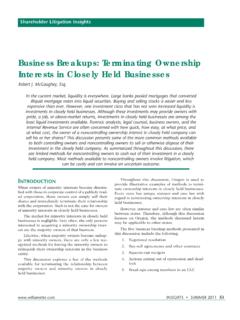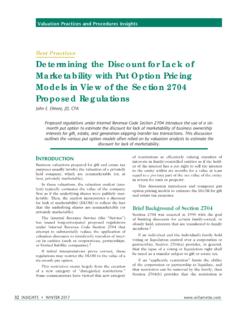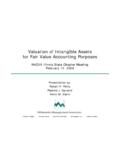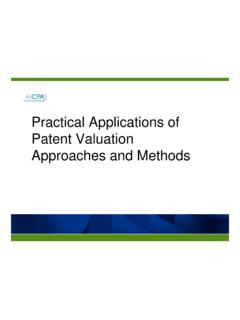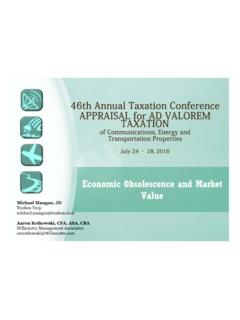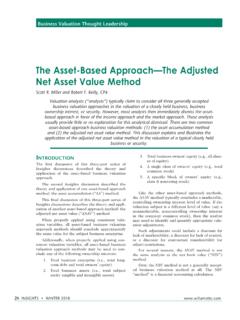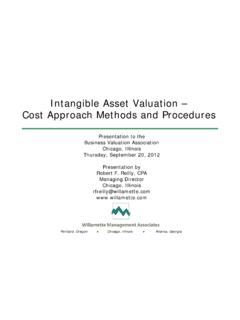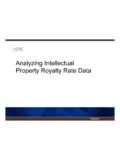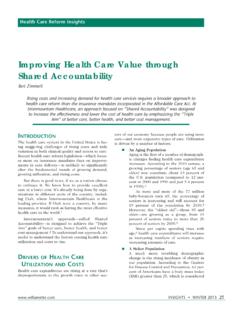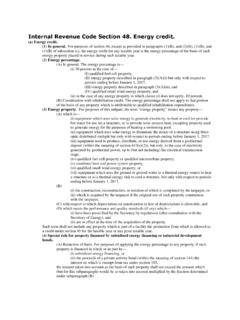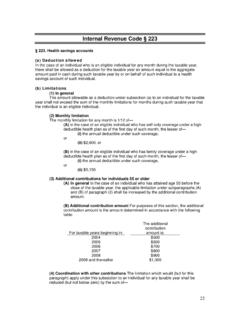Transcription of An Examination of IRC Section 2703
1 Www .willamette .com INSIGHTS AUTUMN 2010 79An Examination of IRC Section 2703 Steve WhittingtonGift and Estate Tax Valuation Insights internal revenue code Section 2703(a) provides guidance on how valuation analysts should consider provisions of shareholder agreements and other restrictive agreements when valuing certain ownership interests for gift or estate tax purposes. The internal revenue Service has used Section 2703 in its attack of taxpayer-submitted valuations of business interests. This discussion summarizes the components of Section 2703 and examines several judicial decisions where the internal revenue Service has used the code Section to rebut the taxpayer s valuation of transferred ownership interests in the context of a family limited revenue code Section 2703 addresses how a valuation analyst should treat certain transfer restrictions that are contained in buy-sell agree-ments, stock purchase agreements, and family limited partnership (FLP) agreements for transfer tax valuation purposes.
2 The Section was established to eliminate situations where a buy-sell agreement (or other agreement) was drafted to be extremely restrictive (intentional or otherwise) thus war-ranting higher valuation discounts in the valuation of the entity s ownership interests yet somehow be nonbinding or discussion defines Section 2703 (a) and (b), as codified under Chapter 14, summarizes the rea-sons and effects of the Section , and concludes with a discussion of two valuation-related court cases Sidney E. Smith III v. United States (2004) and Holman v. Commissioner (2010). The outcomes of these decisions were affected by the court s inter-pretation of Section revenue code Section 2703 dEF in Ed1 Section 2703 has two components the General Rule, which is described in Section 2703(a), and Exceptions, which are described in Section 2703(b).
3 The following paragraphs present the language con-tained in Section 2703: Section 2703. Certain rights and restric-tions disregarded(a) General Rule For purposes of this sub-title, the value of any property shall be determined without regard to (1) any option, agreement, or other right to acquire or use the property at a price less than the fair market value of the property (without regard to such option, agreement, or right), or (2) any restriction on the right to sell or use such property.(b) Exceptions Subsection (a) shall not apply to any option, agreement, right or restriction which meets each of the following requirements: (1) It is a bona fide business arrange-ment. (2) It is not a device to transfer such property to members of the decedent s family for less than full and adequate consideration in money or money s worth.
4 (3) Its terms are comparable to simi-lar arrangements entered into by per-sons in an arm s-length oF Section 2703 The Section 2703(a) General Rule is that, for estate, gift, and generation-skipping transfer taxes 80 INSIGHTS AUTUMN 2010 www .willamette .compurposes, the value of any property is determined without regard to any right or restriction relating to the property that would result in the property being valued at less than its fair market by itself, it appears that the General Rule would render any buy-sell agreement or sharehold-ers agreement moot from the standpoint of consid-ering the agreement in the estimation of a lack of marketability discount. However, Section 2703(b) allows for certain exceptions to the provision con-tained in Section 2703(a).
5 There are exceptions to the rule that certain rights and restrictions are to be disregarded for valuation-related purposes. One exception is actu-ally an enhancement of the case and regulatory law that existed before the enactment of Chapter Another exception can be viewed as a liberaliza-tion of the case and regulatory law when applied to entities that are not controlled by a single family (2703(b)(2)).Each of the Section 2703(b) three require-ments must be independently satisfied for a right or restriction to meet the exception requirement. For example, showing that an option, agreement, right, or restriction is a bona fide business arrangement is not sufficient to satisfy the other two other words, establishing that the right or restriction is a bona fide business arrangement does not, in and of itself, also establish that the option, agreement, right, or restriction is not a device to transfer property for less than full and adequate requirement that each of the three Section 2703(b) tests be satisfied independently has been discussed in several court cases.
6 For example, in Estate of Lauder v. Commissioner (1990), the Tax Court stated the restrictive agreement must have been entered into for a bona fide business reason and must not be a substitute for testamentary dis-position. The Tax Court further concluded that a buy-sell agreement in a bona fide business arrangement does not eliminate the possibility that it was a testamen-tary device. 3 The Tax Court s analysis of the testamentary device test, as it related to a buy-sell agreement, is included in Estate of Blount v. In its analysis, the Tax Court examined various factors of the subject buy-sell agreement as of the date of the factors included: (1) the reasonableness of the purchase price contained in the agreement, (2) the intent of the parties to the agreement, and (3) the facts leading to the conclusion that the agreement is a substitute for a testamentary device.
7 Factors that the Tax Court reviewed in determining whether the buy-sell agreement was a testamentary substitute included the following:1. the grantor s health at the time the agree-ment was executed2. any significant changes in the business as of the date of the agreement was entered into3. selective enforcement of the restrictive pro-visions of the agreement4. the nature and extent of negotiations that occurred among the parties to the agree-mentInvariably, many of the Section 2703 prior court cases came down to a challenge of Section 2703(b) as opposed to Section 2703(a). This is because the taxpayer is ultimately trying to prove that the options, agreement, rights, or restrictions that impact the subject property interest should be considered in the analysis under the exceptions, or safe harbor clause of Section 2703(b).
8 The reasons for this are fairly clear; if the subject property interest is to be valued without regard to the exceptions described in Section 2703(b), the taxpayer runs the risk of a revaluation of the proper-ty interest by the Service. And, this revaluation may ultimately result in a higher concluded value for the property interest and a higher level of transfer Service s use of Section 2703 to challenge the valuation of property interests is not limited to cases where the subject property interest is subject to a buy-sell Service has expanded its use of Section 2703 to challenge the validity, for valuation-related purposes, of certain provisions of FLP following discussion summarizes two judi-cial decisions where the Service used Section 2703 to challenge the taxpayer s valuations of ownership interests in FLPs that were prepared for transfer tax e.
9 SmiTh iii v. Uni Ted sTaTes5In the case of Sidney E. Smith III (and executors of the Estate of Sidney E. Smith Jr.), the District Court for the Western District of Pennsylvania dis-regarded transfer restrictions in the Smith FLP for gift tax valuation Smith and his children, Sidney and Jill, formed Smith FLP. Upon formation of the partnership, the partners collectively contributed to the FLP 100 www .willamette .com INSIGHTS AUTUMN 2010 81percent of the common stock of an operating com-pany. Smith was a 2 percent co-general partner and his son was a 1 percent co-general partner. Upon formation, Smith owned a percent limited partnership interest, his son owned a percent limited partnership interest, and his daugh-ter owned a percent limited partnership initially transferred a percent lim-ited partnership interest to each child.
10 Later in the same year, he transferred an additional percent limited partnership interest to each child. Smith filed a gift tax return valuing the transfers at $1,025,392 and paid a gift tax of $262, Service audited the gift tax return and increased the total value of the transfers to $1,828,598. This adjustment resulted in an assess-ment by the Service of $360, paid the additional gift tax, requested a refund, and after six months filed suit in Federal Claims Court under the provisions of Section IssueThe Smith FLP partnership agreement contained provisions that restricted transfers of partnership interests. The agreement also granted the partner-ship a right of first refusal to acquire any partner-ship interests that were the subject of a prohibited right of first refusal limited the price that the partnership would be required to pay a partner for his limited partnership interest.
